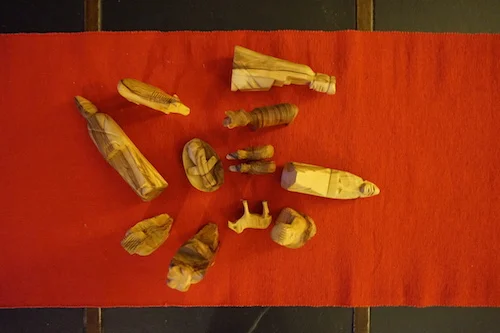Christians love to ask each other how they “got saved.” It’s never been an easy question for me to answer. If you ask, I’ll probably say that I am saved, but also that I am being saved all the time, that it’s a thing I’m working out with more than a little fear and trembling. I’ll say that my “testimony” involves a lot of stories, not just one. My personal history of faith is all bound up in my personal history as a writer and a reader. If you have time to listen, I’ll tell you some of the tales.
All in Bookish
Growing Up With Imogene Herdman
Indeed, I knew all about the Herdmans; I lived across the street from a real live set of them, and as we read The Best Christmas Pageant Ever, fear started to fade and intrigue began to grow. This was the first time I rooted for the alleged bad guy.
The Ongoing Search for Gratitude
I need to enumerate the good things in my life. I need to lift my camera to my face in order to see the gratitude. I need to write about it every day and share it with whoever will listen. I need to look around and pay attention. I need to say thank you to my Creator, on good days and bad.
On Honest Art
For a day we considered our deepest disposition, sons of Adam and daughters of Eve that we are: we compartmentalize, we believe one thing to be true and behave as if another thing is true, we say “This matters most!” and then live as if it doesn’t really. This tendency has profound implications, for learning, for labor, for love, for liturgy—for all of who we are, for all of how we live.
How do we begin to find our way to coherence? Can we even imagine a way of seeing and hearing that honestly connects what we believe with the way that we live?
 When I tell people that I am a food writer, they always ask me what I like to cook. I want to ask them if they would ask a film critic to tell them about the movie they are shooting at the moment, but instead I just smile and say, “Scrambled eggs.” That is only part of the truth, but I don’t usually tell them that I started writing about food before I started cooking, creating standards that I could never meet. I do not tell them that fear of failure often means that I eat pre-made guacamole or cheese and crackers for dinner. I worry that this will take away my credibility, even though I know that not everyone who writes about food claims to be good at preparing it.
When I tell people that I am a food writer, they always ask me what I like to cook. I want to ask them if they would ask a film critic to tell them about the movie they are shooting at the moment, but instead I just smile and say, “Scrambled eggs.” That is only part of the truth, but I don’t usually tell them that I started writing about food before I started cooking, creating standards that I could never meet. I do not tell them that fear of failure often means that I eat pre-made guacamole or cheese and crackers for dinner. I worry that this will take away my credibility, even though I know that not everyone who writes about food claims to be good at preparing it.
 Hospitality is serving people and helping people who are in our home. We listen. If they stay in our home, I fix meals and prepare a bed and so forth for them. I read something about—I think it is Benedict's Rule of Hospitality—that there's a difference between serving and being a servant. When I'm serving, I'm in charge. If I'm a servant, you're part of it. If you want to do something to help me, I'll let you do it because that's allowing you in. You're not being in charge. I'm not being in charge.
Hospitality is serving people and helping people who are in our home. We listen. If they stay in our home, I fix meals and prepare a bed and so forth for them. I read something about—I think it is Benedict's Rule of Hospitality—that there's a difference between serving and being a servant. When I'm serving, I'm in charge. If I'm a servant, you're part of it. If you want to do something to help me, I'll let you do it because that's allowing you in. You're not being in charge. I'm not being in charge.
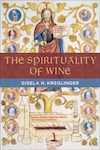 Could it be that God wanted to redeem not only my life but also all the hustle and bustle that life on the winery brings? We work so hard to make a living from growing vines and crafting wine. Could it be that God cared about it and perhaps was even involved in it? This idea is not quite what I had learned in my confirmation classes over the last two years. But was it not true? Had Jesus not made wine as well?
Could it be that God wanted to redeem not only my life but also all the hustle and bustle that life on the winery brings? We work so hard to make a living from growing vines and crafting wine. Could it be that God cared about it and perhaps was even involved in it? This idea is not quite what I had learned in my confirmation classes over the last two years. But was it not true? Had Jesus not made wine as well?
 When I imagine a rich and balanced life, I picture a home much like Sagamore Hill, bustling with active bodies and active minds, where faithful character above all drives the life of the family. One of Roosevelt’s most common phrases for his experiences was great fun. When mind, body, and spirit are working and growing together, life can indeed be great fun, whether on icy river waters or in the comfort of home.
When I imagine a rich and balanced life, I picture a home much like Sagamore Hill, bustling with active bodies and active minds, where faithful character above all drives the life of the family. One of Roosevelt’s most common phrases for his experiences was great fun. When mind, body, and spirit are working and growing together, life can indeed be great fun, whether on icy river waters or in the comfort of home.
 I listen for what I can affirm. I presume that people have treasured enthusiasms that are worthy of affirmation in some small way, and I try to find out what is it about the football game or even the legislation that seems to address a hope or a fear in that person. I start there and see where we can go. I do that in the classroom all the time, when I say something that leads a student to conclude that I’m not on their side. I try to provoke. I think everything I say I really believe, but I do try and direct it in such a way that it invites a sometimes passionate response, or at least that makes the person feel they must respond in order to be true to who they are. And once they do that, that’s not the end of the conversation. That’s the beginning of more questions.
I listen for what I can affirm. I presume that people have treasured enthusiasms that are worthy of affirmation in some small way, and I try to find out what is it about the football game or even the legislation that seems to address a hope or a fear in that person. I start there and see where we can go. I do that in the classroom all the time, when I say something that leads a student to conclude that I’m not on their side. I try to provoke. I think everything I say I really believe, but I do try and direct it in such a way that it invites a sometimes passionate response, or at least that makes the person feel they must respond in order to be true to who they are. And once they do that, that’s not the end of the conversation. That’s the beginning of more questions.
 I want to live a contemplative life and, as an extension of that, to be a contemplative writer. I already tend toward that kind of life. I love thinking and getting into the deep space in my mind to explore and make connections. But getting into that space in a meaningful way can be difficult because it requires time and space. If there are no empty spaces for contemplation, there is no contemplation.
I want to live a contemplative life and, as an extension of that, to be a contemplative writer. I already tend toward that kind of life. I love thinking and getting into the deep space in my mind to explore and make connections. But getting into that space in a meaningful way can be difficult because it requires time and space. If there are no empty spaces for contemplation, there is no contemplation.
 Though it shook her, Una loved the book. In fact she turned around and read it again straight through. I wanted to ask about it, but tried to give her space. I wondered how she experienced the story; I wondered at the contours of her approach toward, and immersion in, this particular encounter—with the characters, the tragedy, and ultimately with her own mortality.
Though it shook her, Una loved the book. In fact she turned around and read it again straight through. I wanted to ask about it, but tried to give her space. I wondered how she experienced the story; I wondered at the contours of her approach toward, and immersion in, this particular encounter—with the characters, the tragedy, and ultimately with her own mortality.
 I’m told I’m a good hostess. Plenty of interesting food—down-home victuals perked up by saucy suggestions found in vintage recipe books. I get people talking. I listen for laughter and bring out more food, and by the time the last mug is laid to rest on the coffee table, I’m exhausted. I go to bed saying it was so much work I’m never going to host another dinner. But in the morning I awake smiling, knowing a good time was had by all who came expecting one. Like my mother, I enjoy having entertained, enjoy having offered my home-cooked sustenance.
I’m told I’m a good hostess. Plenty of interesting food—down-home victuals perked up by saucy suggestions found in vintage recipe books. I get people talking. I listen for laughter and bring out more food, and by the time the last mug is laid to rest on the coffee table, I’m exhausted. I go to bed saying it was so much work I’m never going to host another dinner. But in the morning I awake smiling, knowing a good time was had by all who came expecting one. Like my mother, I enjoy having entertained, enjoy having offered my home-cooked sustenance.
Maybe I’m like my mom in yet another way. Mom’s mind-set in me may explain why I continue to pursue creative writing when it’s one of the most strenuous mental workouts I can imagine.
 My first baby was an Advent baby. Born just a few days after the Church calendar turned over in late November, she arrived in the thick of Christ’s own birth season. As such, her birthday (and mine too, in a sense) now serves as a preface to all of my Advent meditations, forever changing the way I come into Christmas each year. It invites me to remember the vivid physicality of her birth — its pure wonder and raw intensity — and to ponder the Christmas story in light of it. Particularly the role of Mary, who was singly invited and appointed to aid in bringing deliverance to mankind through her own very natural delivery.
My first baby was an Advent baby. Born just a few days after the Church calendar turned over in late November, she arrived in the thick of Christ’s own birth season. As such, her birthday (and mine too, in a sense) now serves as a preface to all of my Advent meditations, forever changing the way I come into Christmas each year. It invites me to remember the vivid physicality of her birth — its pure wonder and raw intensity — and to ponder the Christmas story in light of it. Particularly the role of Mary, who was singly invited and appointed to aid in bringing deliverance to mankind through her own very natural delivery.
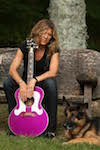 I am contemplative and introverted. I am tactile and love to make things. These are all catalysts for articulating my individuality. I am also an alcoholic, a drug addict, an egomaniac with an inferiority complex and an emotional lightning rod. These things do not supply my identity either, though they are as much a part of me as the traits I cherish. And I am equally grateful for them because the helplessness they triggered ushered me further into dependence on God and finding my place on the path, one step at a time.
I am contemplative and introverted. I am tactile and love to make things. These are all catalysts for articulating my individuality. I am also an alcoholic, a drug addict, an egomaniac with an inferiority complex and an emotional lightning rod. These things do not supply my identity either, though they are as much a part of me as the traits I cherish. And I am equally grateful for them because the helplessness they triggered ushered me further into dependence on God and finding my place on the path, one step at a time.
 Like committing crummy jokes to memory, remembering is intentional, the discovery of great gain in contentment. Where the debris of spilled baggage reaches its angle of repose, the place where physical objects come to rest along an incline (to borrow from Wallace Stegner), there is rest from the near-constant onslaught of shame, of striving to be enough, to make ourselves worthy, to, in effect, make gods of ourselves. And maybe not being enough is a healthy place to be, a place where God is good and is enough, all the time.
Like committing crummy jokes to memory, remembering is intentional, the discovery of great gain in contentment. Where the debris of spilled baggage reaches its angle of repose, the place where physical objects come to rest along an incline (to borrow from Wallace Stegner), there is rest from the near-constant onslaught of shame, of striving to be enough, to make ourselves worthy, to, in effect, make gods of ourselves. And maybe not being enough is a healthy place to be, a place where God is good and is enough, all the time.
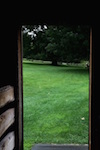 I think fiction writers do have something I lack. They must have the capacity to close their eyes, at least a little bit, to the world outside their window. With eyes half open they are free to imagine. Free to conjure whole worlds and lives. They are magicians as much as artists, and I am the grateful recipient of their magic.
I think fiction writers do have something I lack. They must have the capacity to close their eyes, at least a little bit, to the world outside their window. With eyes half open they are free to imagine. Free to conjure whole worlds and lives. They are magicians as much as artists, and I am the grateful recipient of their magic.
But I cannot close my eyes. Not even a little bit. I write nonfiction because so many memories are tapping at my window, there is no room left in my mind for any invention. I am wholly preoccupied observing and studying that which is already there.
 One cold and sleepless night I was suddenly overtaken by a thought that gave me such a panic that I immediately got up, wrapped myself in a quilt, and went to the kitchen to make myself a cup of tea. What if this was it? What if my mother never came back to us? What if all the stories I had heard my entire life went with her?
One cold and sleepless night I was suddenly overtaken by a thought that gave me such a panic that I immediately got up, wrapped myself in a quilt, and went to the kitchen to make myself a cup of tea. What if this was it? What if my mother never came back to us? What if all the stories I had heard my entire life went with her?
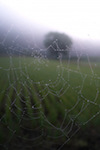 In order to reconcile myself to the difference I feel between Mr. Berry's observation of the world and mine — at my own risk, according to his prefaced warning — I listen to him as I would a prophet rising to an appointed calling, announcing judgment to all transgressors, calling us to change the way we live in order to be spared. He is a surly prophet, but better an ornery prophet than unmerciful judge. I would not want you, Mr. Berry, as my judge. You seem too convinced of my guilt before hearing my story.
In order to reconcile myself to the difference I feel between Mr. Berry's observation of the world and mine — at my own risk, according to his prefaced warning — I listen to him as I would a prophet rising to an appointed calling, announcing judgment to all transgressors, calling us to change the way we live in order to be spared. He is a surly prophet, but better an ornery prophet than unmerciful judge. I would not want you, Mr. Berry, as my judge. You seem too convinced of my guilt before hearing my story.
 For a long time, I did not love poetry.
For a long time, I did not love poetry.
I read poetry. I memorized poetry to get me through a job that left me weary from boredom. I tried to understand poetry. But I didn't love it.
I loved words. Any words. Words in books, words in songs, words on the shampoo bottle. I loved stories — long ones, short ones, fat ones, skinny ones. I loved metaphors. I even loved select poems. But I did not love poetry.
In the Name of the Father
I did not know then nor do I know now the full nature of God. No one does, but we’re given glimpses through the revelation of nature, the testament of history and its saints, and especially through the ordinary people who love us and mark our days. As a child my earthly father represented whatever goodness, safety, and unconditional love there was to be found in this world. And that has everything to do with why I call myself a Christian today, and can still refer to God as Father, problematic though it may be for me as a 21st-century woman.
















